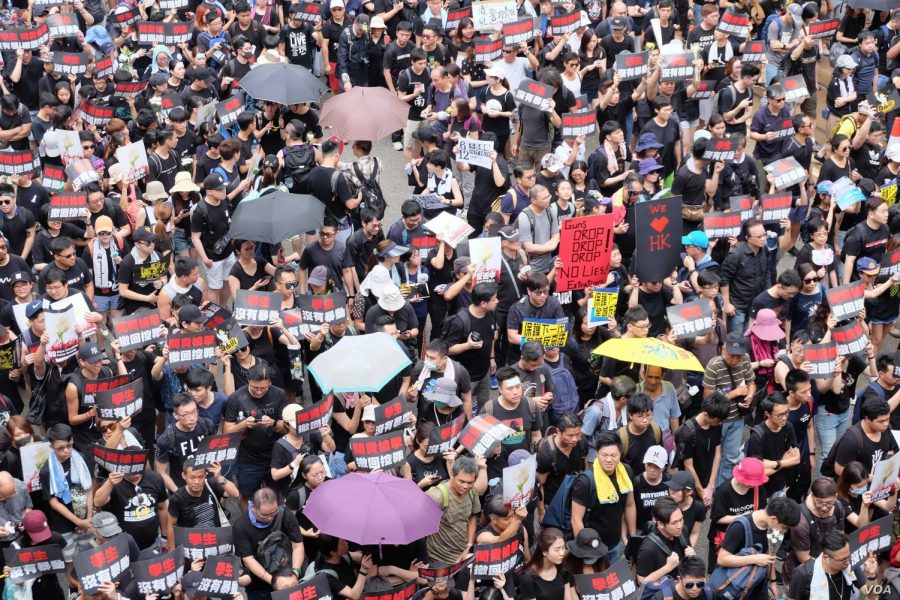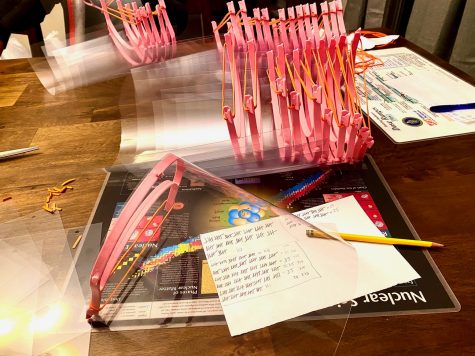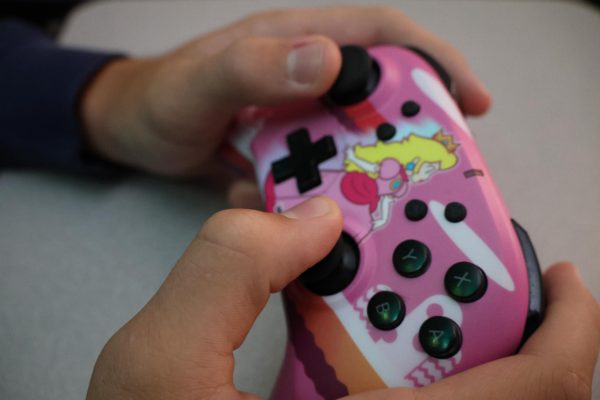Why you should have cared about the Hong Kong protests
June 2019.
8:31 p.m.
FaceTime.
My dad slides his phone towards me, revealing my grandmother’s face on the front camera.
“Hello, Mama!” Mama is the Cantonese word for my paternal grandmother.
For my benefit, she returns my greeting in English. After the usual acknowledgements, I sit at the kitchen table across from my father, attempting to complete my homework. I overhear their conversation.
“Those college kids outside are protesting all night these days!” my grandmother exclaims in Cantonese.
7,780 miles away, across the Pacific Ocean, stands 427 square miles of mountain and skyscrapers just off the coast of China — home to approximately 7.5 million people, including my grandmother. This little island is named Hong Kong, and my grandmother lives within walking distance from the University of Hong Kong. Although she’s never complained to me, I’ve heard the weekly conversations she and my father have about the conditions in the city, and the videos my dad blasts on his computer. The subways, a staple transportation system in Hong Kong, have closed during some of the most extreme days of protests. At some points, my aunt couldn’t even leave for work.
“About a third of the people that live in Hong Kong were out on the street,” my grandmother told him. “It’s never going to get any better.”
Hong Kong. The name probably sounds familiar — it’s in China, right? While these protests may not mean much to most Americans, they represent a struggle to preserve freedom and democracy, and could potentially terminate American trade relations with Hong Kong.
As of March 15, Hong Kong residents have led protests through the streets of the city, initially protesting an extradition bill pushed by China that would allow Hong Kong to extradite suspects to China for a trial, as opposed to holding it in Hong Kong. This invoked residents’ fears that China could undermine their judicial independence and suppress Hong Kong journalists and activists.
Over the past few months, protests have escalated to extreme violence 一 the bombing of universities, the destruction of the vital subways, and the shooting of one 18-year-old protester by police, though non-fatal.
Under the 1842 Treaty of Nanjing, Hong Kong was ceded to Britain and was returned to China in 1997. However, instead of immediately returning to Chinese control, Hong Kong would be given 50 years of sovereignty following the Sino-British Joint Declaration (1984) deal under the “one country, two systems” rule. According to the declaration, the Hong Kong administrative region belongs to China but has special privileges, including a high degree of autonomy, consisting of a democratic popular vote as well as limited economic freedom. Hong Kong’s prevailing legal, social and economic systems from British rule would remain unchanged, a stark contrast from the institutions of China.
In short, the citizens of Hong Kong fear that their democracy and political institutions will be taken away by China.
This group of protestors consists of a demographic centered around younger generations seeking a variety of changes — including a fight for democracy and their identities. If I, a young person who identifies as Hong Kong Chinese, had grown up in Hong Kong instead of a Chicago suburb, I would very much be out on the streets with my classmates, fighting for democracy and the home I grew up in.
A growing abundance of young people are politically active in America. Whether it be Feminism, the environment, Black Lives Matter, LGBTQ activism or political rallies, we, as young teens, like to stand up for something. Hong Kong protestors do not just fight for change, but for their “country,” their ideas, their identities — their freedoms and liberties.
Not only will China’s tightening control over Hong Kong affect the citizens of the country, but the global economy as well.
Labeled a “gateway” to China, Hong Kong’s location and enticing laissez-faire government have led a plethora of countries, including the U.S., to maintain trade relations with the island. In 2019, Hong Kong housed 278 American company regional headquarters, and another 457 companies had regional offices according to Hong Kong’s Census and Statistics Department.
Benefiting from the United States-Hong Kong Policy Act since 1992, the United States may treat Hong Kong separately from mainland China through trade. When China is given the opportunity to change Hong Kong’s government in 2047 — when the Sino-British Joint Declaration is expected to end — the economic relationship between Hong Kong and the U.S. will likely die-off, with many countries to follow. This impact has already begun — the tight trade and financial relationship between the city and the U.S. is a result of its position as a safer access to China, and this relationship could be compromised.
From the time Hong Kong became a British colony in 1842, the people have developed a mix of cultures and ideals; a direct contradiction to the communism of China. But when China takes over Hong Kong, which it shouldn’t until 2057, “the erosion of Hong Kong’s political and economic autonomy, civil liberties, and the rule of law threaten to undermine the city’s economic prosperity and distinctive culture,” according to the HK, Recent Developments and U.S. Relations. All of the autonomy that Hong Kong had and all of the liberties and distinctions from China will eventually merge into that of the Communist Party of China.
Protests have escalated to points where residents like my aunt couldn’t even step outside. My dad cancelled his Hong Kong trip due to the sheer violence and chaos there. Hong Kong continues to fight, which prompts this question: how can a little dot-sized island on a map fight the determination of all of mainland China? As Americans, we think of our country as a symbol of democracy and freedom and throughout history, we have fought for those ideas. Now, it’s time to take that fight to Hong Kong.

A senior at North, Faith is thrilled to begin her third year with The North Star as the Multimedia Creative Director. In addition to designing graphics...











